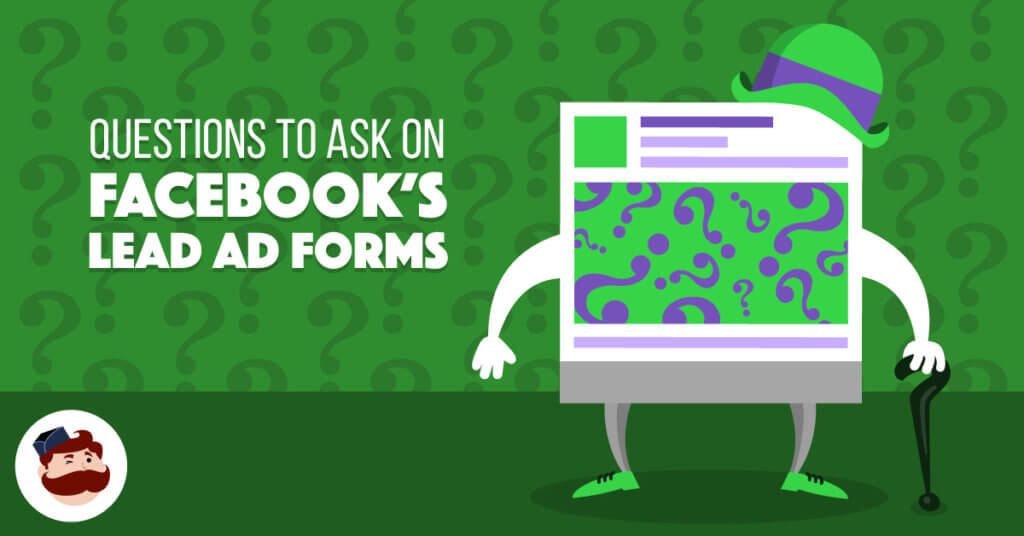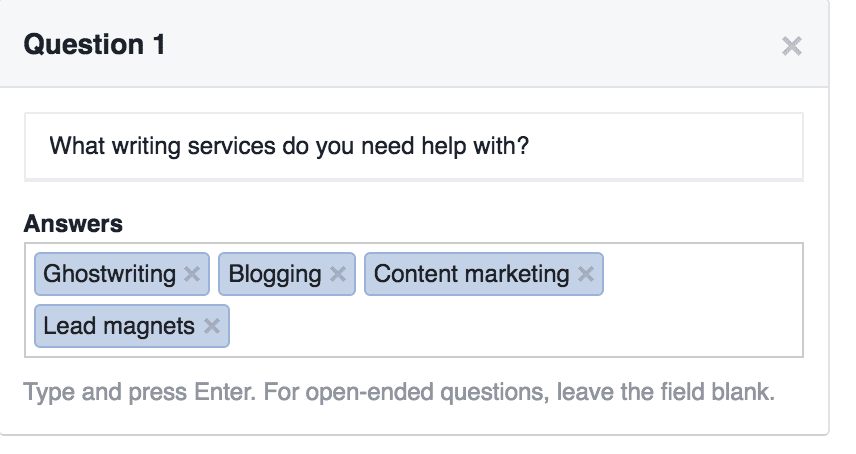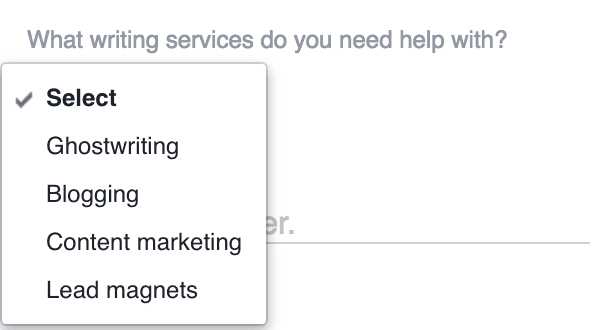Leads had long been frustrating to gather from social media ads before Facebook’s Lead Ads came along.
With mobile users being able to access a form quickly within the app (instead of having to leave to another, slow-loading, data-devouring landing page) and Facebook automatically filling out all the information it can, users are a lot more likely to convert.
Facebook’s Lead Ads are a valuable tool for businesses of all sizes, allowing us to gather information from relevant users to nurture leads. This is especially true considering the forms are so customizable, enabling us to ask almost anything that we want.
As many businesses and salespeople know, asking the right questions can make a world of difference when you’re trying to turn a lead into a customer and close a sale, so this post is going to take a look at the questions to ask on lead ad forms (and the ones you shouldn’t).
1. Name & Email
This seems obvious, but it’s really important, so it’s on our list of questions to ask on lead ad forms. Get the user’s name (at
Get the user’s name (at a minimum, their first name) and always get their email address. I specifically recommend focusing on email address instead of phone number. When you put down an email address as a user, it doesn’t feel like there’s much at stake, though some are less likely to put down a phone number.
We’re so used to text messages that if most of us get a call from an unknown number that we’re not waiting for, many of us will ignore it. We’ll at least read the subject of an email before we decide if we want to ignore it or not. Emails are also more convenient; users can take the time to read them when they actually have a moment, where phone calls/texts can sometimes be more of an interruption.

It’s simple but effective. Entire campaigns are run getting only this information, and they still benefit the business.
Bonus: if you’re sending them an eBook or a discount in exchange for their information, they’ll probably actually open the email that you send.
Email is not only essential for making contact, but also for continual lead nurturing; getting new relevant names for your email list is exceptionally important.

This campaign example only asked for the users’ email address; not even a name.
You can still request a phone number, but if you’re only choosing one or the other, always go with email. I think email is even more important than the name (but it’s still normally a good idea to ask for both).
While these two questions are already automatically checked when creating all new lead ad forms, the email, in particular, is so important I didn’t want to leave it off this list.
2. Zipcode
This isn’t applicable to all businesses, but is definitely appropriate for any brands that have any type of location-related element to their business. This includes shipping restrictions or companies that have different branches. Asking for a user’s zip code or city is an effective method to determine if you can convert the user from a lead into a customer and what department/branch to send them to if needed.

If you ask for too much location data, your form can get cluttered really fast.
While you can ask for a state or a zip code, it’s normally a good idea to just pick one; the less forms a user has to enter or approve, the better (even if Facebook is filling it out for them). For local businesses only wanting to reach a local audience, remember to target your ads accordingly.
3. Qualifying Multiple Choice Questions
In addition to the preset demographic questions that you can choose from, you can enter your own questions that you want to ask your leads. These questions should be simple, concise, and straight-forward. They should also be used for lead qualification.
While you can leave all questions open-ended, I’ve noticed that many of my clients have more success on their campaigns when they provide easy-to-select multiple choice options.
Let’s say I’m going to run a lead ad campaign to find new clients. My question could be “what writing services do you need help with?” Answers could include “ghostwriting,” “blogging,” “content marketing,” and “other.” This is often positive for users who aren’t familiar with your brand or product yet, and it’s a great way to showcase some of your products or services.
It never hurts to include an “other” option for users to select; I recommended it. That way, if they feel like they don’t fit any of the other answers, they don’t have to pick something that doesn’t apply to them.
What Not to Do
Each business is wildly different from the one next to it (even within the same industry), so best practices may vary. Split testing never hurts, allowing you to determine what works best for your business.
While best practices may vary, worst practices typically don’t. In my experience, there are a few things brands do that significantly decrease conversion rates of their lead ads. These include:
- Asking too many questions. Lead ads let you fill up your mobile form with a ton of questions. While this seems like a good thing, most users will take a look at that and just think nope. The more questions you ask, the more likely it’ll be that they’ll need to fill them out. You also lower the number of leads to a number of people willing to share that much information up front (many won’t).
- Asking for an address. While it’s common for many users to post a lot of personal information online, the address is something many are (rightfully) stingy with. If users see an address request on the form, a ton of them are going to click away really fast. If you’re a local business and need to ask for a zip code, that’s fine; anything else, I wouldn’t push it.
- Asking for irrelevant information. If all you need is an email, a name, and a zip code, go with that. If all you need is a name and an email, keep it there.
While you can get more information if you need it or could help you, adding unnecessary information just becomes a hassle for everyone. A great example would be if I decided to request a company name for my imaginary lead ads promoting my services; while this could be relevant for some potential leads, many of my clients hire me personally instead of through a business, and it wouldn’t be applicable.

Facebook’s lead generation ads make the process of lead gen simple for both users and marketers; don’t complicate it.
Final Thoughts
Lead Ads can be a huge source of new leads for your business, especially when coupled with lead magnets. In order to maximize your ROI, however, you need to ask the right questions on your lead forms.
The specifics of these questions may look a little different for each business, but simplicity is always key. By getting the essential information you need most (and nothing else) will increase the number of leads you get.
When in doubt, you can run highly targeted campaigns for specific lead forms; you don’t have to stick to just one. This can give you the chance to ask relevant questions to those audiences, which can result in better leads. The biggest allure of lead ads is the fact that they’re not a lot of work; the less effort needed, the better.
What do you think? What are your top questions to ask on lead ad forms? How have you gotten the best results? Let us know in the comments below!



Great questions but why we need to ask zip code from someone. What we do with a zip code.